Press releases
Even today, the threat of genocide in our region is considered as a phenomenon needing urgent prevention. Nikol Pashinyan
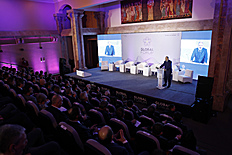 1670x1113px - 655 Kb
1670x1113px - 655 Kb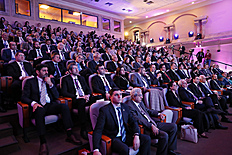 1670x1113px - 1019 Kb
1670x1113px - 1019 Kb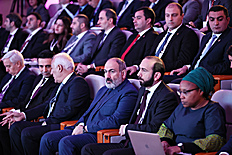 1670x1113px - 876 Kb
1670x1113px - 876 Kb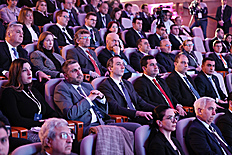 1670x1113px - 1015 Kb
1670x1113px - 1015 Kb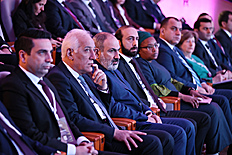 1670x1113px - 840 Kb
1670x1113px - 840 Kb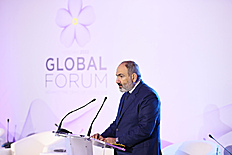 1670x1113px - 358 Kb
1670x1113px - 358 Kb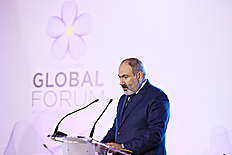 1670x1113px - 371 Kb
1670x1113px - 371 Kb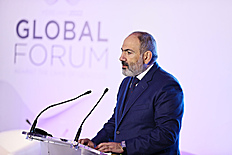 1670x1113px - 443 Kb
1670x1113px - 443 Kb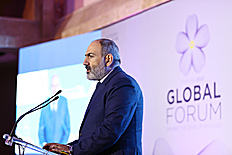 1670x1113px - 510 Kb
1670x1113px - 510 Kb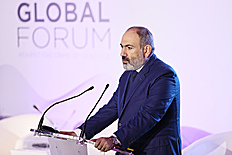 1670x1113px - 470 Kb
1670x1113px - 470 Kb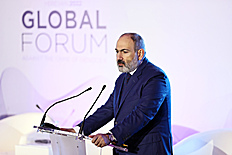 1670x1113px - 439 Kb
1670x1113px - 439 Kb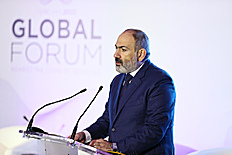 1670x1113px - 474 Kb
1670x1113px - 474 Kb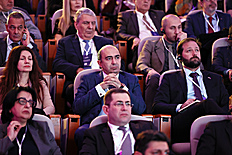 1670x1113px - 855 Kb
1670x1113px - 855 Kb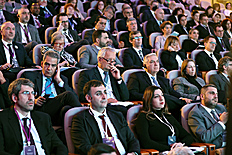 1670x1113px - 985 Kb
1670x1113px - 985 Kb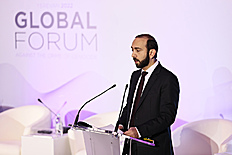 1670x1113px - 386 Kb
1670x1113px - 386 Kb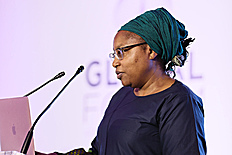 1113x1670px - 578 Kb
1113x1670px - 578 Kb
more 13 photos
Today, Prime Minister Nikol Pashinyan participated in the opening of the 4th Global Forum "Against the Crime of Genocide" in Mesrop Mashtots Research Institute of Ancient Manuscripts. The conference is being held on December 12-13 in Yerevan under the title "Prevention of Genocide in the Age of New Technologies".
The President of Armenia Vahagn Khachaturyan, President of the National Assembly Alen Simonyan, members of the Government, high-ranking officials, famous genocide scholars, representatives of prestigious international organizations, experts, ambassadors attended the event.
Prime Minister Pashinyan made a speech, in which he stated:
"Dear President of the Republic of Armenia,
Dear President of the National Assembly,
Dear guests,
Members of the government,
This is the fourth time that Armenia hosts the Global Forum against the Crime of Genocide. I would like to first of all welcome all the participants, our colleagues, officials, scientists, diplomats, politicians and IT professionals who have the mandate to ensure human rights by prevening genocides and other mass crimes, restoring justice and truth.
On December 9, 1948, the UN General Assembly adopted the Convention on the Prevention and Punishment of the Crime of Genocide. Years after the adoption of the Convention, in 2015, thanks to the initiative of Armenia and the broad support of the international community, it was possible to adopt the International Day of Commemoration and Dignity of the Victims of the Crime of Genocide and of the Prevention of this Crime. In this context, I would like to emphasize that during the previous global forums, unfortunately, we started more and more to observe the phenomenon of "genocide" not only as a historical phenomenon, not only as a historical heritage, but also as a danger and a threat, which is still present today in different parts of the world and, indeed, the prevention of genocide becomes a real issue. In this context, we, the representatives of Armenia, usually emphasize and highlight the first genocide of the 20th century, the Armenian Genocide that took place in the Ottoman Empire. But I must emphasize that even today the threat and danger of genocide in our region is considered as a phenomenon needing urgent prevention. In the recent period, in particular, the representatives of the Armenians of Nagorno-Karabakh are alarming the potential genocide as a threat more and more oftern. And I think that we, all of us, and the international community should take those alarms seriously. It seemed that the trilateral declaration signed on November 9, 2020 created the mechanisms to protect the Armenians of Nagorno-Karabakh from potential genocide, but unfortunately, step by step, we have seen and continue to see realities that make the voiced fears more and more objective. And I have to give a small overview of how we moved in the direction of objectifying this kind of danger. In 2021, we already witnessed the realities when civilians carrying out agricultural work in Nagorno-Karabakh were directly killed by a sniper while driving a tractor. Later, we witnessed more severe realities when the Azerbaijani armed forces invaded the zone of responsibility of the Russian peacekeepers in Nagorno-Karabakh, and this process was combined with several realities and phenomena worthy of attention. In particular, when the armed forces of Azerbaijan illuminated the houses of Armenian villages after midnight with powerful searchlights at night, performed an invitation to Islamic prayer and called, threatened the Armenian residents through loudspeakers to leave their settlements. Of course, we have great respect for Islamic civilization and religion, and one of the clearest proofs of this is the Blue Mosque in the center of Yerevan, which, by the way, was restored during the period of Armenia’s independence, but I cannot assess the realities I mentioned otherwise than religious terrorism.
And I must also record that, unfortunately, these actions are not separate or one-time actions. And today we see consistent actions that make the fears that Azerbaijan is really organizing and preparing genocide in Nagorno-Karabakh more and more objective. And in this regard, I must emphasize the provocations that are taking place, in particular, in Lachin corridor. Some try to draw parallels between the Lachin Corridor with other existing communications in the region or communications that may be restored or built, but I must emphasize that the Lachin Corridor is a corridor of genocide prevention, because to close this corridor, to stop the operation of this corridor, means, in fact, sentencing the Armenians of Nagorno Karabakh to genocide in three different scenarios.
The first scenario can be the scenario of pure eviction of Armenians, when the Armenians of Nagorno-Karabakh simply do not have the opportunity to live in their homes, on their land. And in fact, we see the mini-model of this phenomenon in the Hadrut region of Nagorno-Karabakh, where no single Armenian lives today as a result of the 44-day war of 2020. Moreover, I must emphasize that the trilateral declaration of November 9, 2020 provides for the return of refugees to Nagorno Karabakh and neighboring regions with the support of the Office of the United Nations High Commissioner for Refugees. But so far, even representatives of the Office of the United Nations High Commissioner for Refugees did not have the opportunity to enter the given areas, let alone the residents of Hadrut region.
The next scenario that could play out is the loss of identity, which I think is also a possible model for genocide. And today, the struggle that Azerbaijan is waging against the place names and historical and cultural monuments of Nagorno Karabakh is the clearest proof of this. In the context of security in general, when we say security, we sometimes mean only physical security, but identity security is an integral part of human rights and security. The phenomenon that we are seeing, it is even funny to talk about it, is an attempt to present the internationally recognized Armenian historical and cultural monuments as having a different origin. At the same time, we show flexibility also in this matter, which may be criticized by many, saying that, you know, it might not be worth making it an interstate issue, for that there is an international specialized structure, UNESCO, which is capable and has all the expert and professional skills to evaluate historical and cultural genealogy of monuments. But I want to say that this is not just a struggle against inanimate structures, this is a struggle against identity, and that struggle doesn't just have a historical context, that struggle has a practical context. The whole purpose of that struggle is to demonstrate that Armenians have no right to live in Nagorno-Karabakh, because we see the following context of the struggle against these historical and cultural monuments, when an order is given at the state level to erase the Armenian inscriptions and replace them with, so to speak, those recording the real historical facts. It is very difficult to describe this as anything other than a preparation for genocide or at least a policy with such a tendency.
And the third scenario is the physical annihilation, the reality and signs of which we have also seen and are seeing, starting from sniper targeting of civilians doing agricultural work, ending with bombing and shelling of peaceful settlements and civilians during the 44-day war. But you know, I don't want us to perceive and consider the genocide, including the genocide I'm talking about, as an inevitable and unpreventable reality. And I have to record, no matter how strange it may seem now, after this preface, I believe that the most important tool for preventing genocide is dialogue and cooperation, including between Baku and Stepanakert. And we consider this very important in our foreign policy.
Azerbaijan, moreover, demonstrates to the whole world on various occasions that they are ready to ensure the rights and security of the Armenians of Nagorno-Karabakh, but the addressee of that sentence voiced at international platforms seems to be the international community, and not primarily the people who are concerned. Azerbaijan addresses that sentence to the international community, but not to the Armenians of Nagorno-Karabakh. And we believe that this message will be real when it is heard in Stepanakert, in Nagorno Karabakh, among the Armenians of Nagorno Karabakh.
And I specially emphasized that safety is not only physical safety. identity security is an integral part of that security, knowing yourself is an inalienable part of human rights. But on the other hand, I also want to summarize my speech with one or several practical conclusions about what we should do to prevent genocides in general, including in our region. I think that with all the hard realities, current and historical, we need to change the content and quality of our regional relations.
And indeed, it should start from the simplest things, for example, I consider the prevention, management, and ultimately exclusion of hate speech in our region to be the biggest issue, and especially at the official level, but not only at the official level. I don't want the topic of genocide prevention and condemnation to become an occasion for condemning peoples and a platform for deepening peoples' enmity, because I think that indeed, in our region, enmity should also be managed, and it should start with the management of hate speech, which exists at least in Armenia-Turkey, Armenia-Azerbaijan relations. And I don't want us to constantly be in the role of a critic and refuse the opportunity of self-contemplation, starting at the everyday level. For example, one of the most important tools for genocide prevention, I think, is for us to say directly at the official level that we accept, emphasize that we must, for example, including in Armenia, stop using another nation's name for insulting people, including political rivals or opponents. In the Republic of Armenia, there is such a thing, for example, if they want to insult someone in the sharpest way, there is a very simple way to do it, to say: you are a Turk. A person who, due to the circumstances known to you, has deserved that name quite often, I want to tell people who tend to insult me, that they are not insulting me at all, because I do not accept and perceive it as an insult. And in general, I think we should face these realities and try to change them. Azerbaijan also has that reality, for insulting someone, even the worst insults, which in our region, the Caucasus, have a deadly effect, sometimes do not work so effectively when you call someone an Armenian. I think that we at the official level, at the level of governments, should accept the reality and say that we are not at peace with that reality and we do not want the name of the nationalities, the nation, the name of any nation to be used as an insult. And this, I think, is the most important tool for the prevention of genocide.
I assume that there are similar realities in Turkey as well, and my message from this rostrum is as follows: let's start here, we sometimes fail to solve global issues because we cannot diagnose these issues at the genetic level, and this rostrum is very important in that sense, because we are talking about gen-ocide, and in order to understand and prevent this problem, we must be able to understand and diagnose the genetic level of the issue.
And I hope that one of the important discussions in this forum will become just that. For example, there was an idea, and I guess that idea still exists, to start discussions in the South Caucasus in some format between Armenia-Georgia-Azerbaijan. That idea is not new, that idea is quite old. Old, not in the sense of being outdated, but in the sense of time. And I have always supported that idea, but I have proposed a very important fundamental formula. That platform, first of all, should be used only and only in the direction of eradicating hate speech from our region. At official levels, the leaders of the countries should record this, say that we agree to cooperate with each other to eliminate hate speech, even more so at the official level.
And this is where the prevention and condemnation of genocides should start from, because if someone in Azerbaijan, Turkey, Armenia calls someone Armenian or Turk, even more so at the political level, even at the non-political level, he is doing this to morally, politically destroy and humiliate him. And this is essentially the genetic level thinking of genocide.
But on the other hand, I have to say that the fact that I'm now speaking publicly about these issues on this occasion means that we're still moving, it means that we're facing it, it means that we're realizing. I must emphasize that the relations between Armenia-Turkey, Armenia-Azerbaijan and in general in our region are very important in this respect.
By the way, there is another important formula for enmity management. Sometimes it is exactly so that if Armenia says something, then in Azerbaijan or Turkey, the correct reaction is to say 180 degrees the opposite. And the same with us, if Azerbaijan says something, including in a political, official context - not always, of course, but very often we see such directions - the safest reaction is to say something 180 degrees opposite, because it is safe both politically, it's safe morally, and it's safe in a broader, psychological sense.
And today, perhaps for the first time, I want to break this reality and express agreement with a statement that was recently made in Turkey. And the idea was that all the countries of the region, including Turkey, Armenia, Azerbaijan, need each other, in terms of the security of those countries, in a large sense, in terms of ensuring their history, sovereignty, and independence. And this is a very important formula for us to eventually change the mode of relations that I mentioned.
We have to understand one thing: why are we here? Are we here to live side by side, or we are here just to bide time in order to ripen the right opportunity to destroy each other? Such a context, such a subconsciousness exists in our region: in one country more, in another country less, in one country it is at an institutional level, in another country it is at an embryonic level, but we see these realities from time to time.
Returning to modern technologies, I must say that these realities are very evident during the study and monitoring of social networks. And here, the problem of genocide shows and is expresses itself in a new way in new technologies or perhaps in the simplest technology among these new technologies, which is social networks.
I once made an initiative, saying that social networks can become a platform for dialogue rather than hatred. Of course, at that time that initiative failed due to circumstances known to you. But today I want to emphasize that the new technologies that have brought the most distant countries together should also be able to bring closer the countries that are physically located next to each other. This seems to be a very simple issue, but it's actually a very complicated issue, and I wish the forum participants the best of luck in helping to solve this complicated issue.
Thank you”.
Minister of Foreign Affairs of Armenia Ararat Mirzoyan and United Nations Special Adviser on the Prevention of Genocide Alice Wairimu Nderitu made opening remarks. The video message of UN Secretary General António Guterres on the occasion of the International Day of Commemoration and Dignity of the Victims of the Crime of Genocide and of the Prevention of this Crime was also presented.
The 4th Global Forum Against the Crime of Genocide is dedicated to the issue of genocide prevention in the age of new technologies. It will address the challenges, opportunities and prospects of using new technologies in genocide prevention.